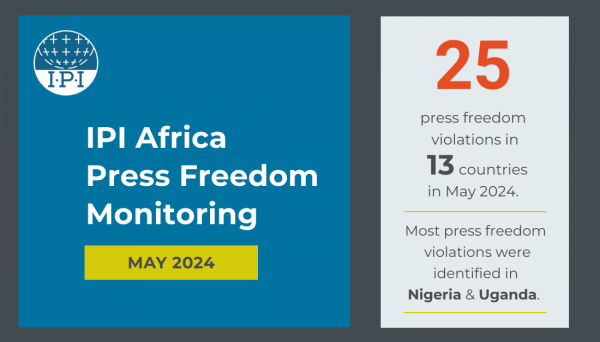His Excellency Lt-Gen. Yoweri Kaguta Museveni
President
Office of the President
Parliament Bldg, POB 7168
Kampala
Uganda
Vienna, 22 March 2002
Your Excellency,
The International Press Institute (IPI), the global network of editors, media executives and leading journalists is greatly concerned by the recent decision of the Ugandan parliament to pass an anti-terrorist law which impedes press freedom.
According to the information before IPI, on 20 March the Ugandan parliament voted to enact the Anti-Terrorism Bill (“the Bill”). The Bill was tabled before parliament in response to the September 11th attacks on the United States but is also an acknowledgement of the country’s internal problems. Since 1997, rebels from the Allied Democratic Forces (ADF) have carried out a number of bombing campaigns in the capital, Kampala.
Formerly known as the Suppression of Terrorism Bill, the Bill imposes tough sentences on terrorists and their sponsors and supporters. The Bill defines terrorism as, “the use of violence or threat of violence with intent to promote or achieve, religious, economic and cultural or social ends in an unlawful manner, and includes the use, or threat to use, violence to put the public in fear or alarm.”
Aside from terrorists, the Bill contains a provision stipulating that “any person who establishes or runs or supports any institution for the promotion of terrorism or disseminates material that promote it, train or mobilize for the same purpose, shall be convicted of terrorism”. The Bill contains a mandatory death sentence for those persons convicted of terrorism.
Concerning banned organisations, the Bill gives the government the power to declare that an organisation is terrorist in nature. Although there was an attempt to amend this provision and place the decision in the hands of parliament, the government successfully fended off the challenge. Speaking of the Bill, Internal Affairs Minister Eriya Kategaya said, “We need to have this power to move quickly and decisively against suspected terrorists before they cause more havoc.”
Bearing the above in mind, IPI is fearful that the Bill may be used to suppress individuals and organisations who dare to criticise the government. Indeed, the provision concerning the dissemination or promotion of terrorism is defined so widely that, when coupled with the power to ban organisations, it gives the government extensive powers to suppress both its political opponents and the media. IPI notes political activity has been banned in Uganda since 1986 and is worried that the Bill will be used to ensure that political debate continues to be stifled.
Regarding the general application of anti-terrorism laws, IPI would remind Your Excellency that the legislation should be proportionate and measured. Since the tragic events of September 11th there has been a rush to legislate on this issue and IPI is of the opinion that laws enacted in haste are invariably badly drafted. Furthermore, IPI strongly believes that anti-terrorism laws should not be used by governments to pursue their own domestic agenda. A worry exacerbated by the current government’s attitude to political debate.
On the related issue of Uganda’s legal obligations, IPI wishes to point out that the Constitution of the Republic of Uganda, Chapter 4, section 29 (1) states, “Every person shall have the right to – (a) freedom of speech and expression, which shall include freedom of the press and other media.” In addition, Uganda is also a signatory to the United Nations Universal Declaration of Human Rights which states under article 19 that “everyone shall have the right to “seek, receive and impart information”.
Therefore, IPI would invite Your Excellency to re-examine the Bill in light of Uganda’s international obligations and to make all necessary amendments to ensure that freedom of the media and freedom of expression are guaranteed. Furthermore, the Bill has yet to be promulgated and IPI would ask that this procedure is discontinued while the law is re-evaluated.
We thank you for your attention.
Yours sincerely,
Johann P. Fritz
Director


